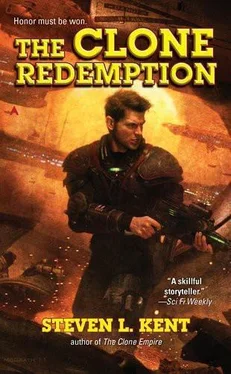Steven Kent - The Clone Redemption
Здесь есть возможность читать онлайн «Steven Kent - The Clone Redemption» весь текст электронной книги совершенно бесплатно (целиком полную версию без сокращений). В некоторых случаях можно слушать аудио, скачать через торрент в формате fb2 и присутствует краткое содержание. Жанр: Боевая фантастика, на английском языке. Описание произведения, (предисловие) а так же отзывы посетителей доступны на портале библиотеки ЛибКат.
- Название:The Clone Redemption
- Автор:
- Жанр:
- Год:неизвестен
- ISBN:нет данных
- Рейтинг книги:4 / 5. Голосов: 1
-
Избранное:Добавить в избранное
- Отзывы:
-
Ваша оценка:
- 80
- 1
- 2
- 3
- 4
- 5
The Clone Redemption: краткое содержание, описание и аннотация
Предлагаем к чтению аннотацию, описание, краткое содержание или предисловие (зависит от того, что написал сам автор книги «The Clone Redemption»). Если вы не нашли необходимую информацию о книге — напишите в комментариях, мы постараемся отыскать её.
The Clone Redemption — читать онлайн бесплатно полную книгу (весь текст) целиком
Ниже представлен текст книги, разбитый по страницам. Система сохранения места последней прочитанной страницы, позволяет с удобством читать онлайн бесплатно книгу «The Clone Redemption», без необходимости каждый раз заново искать на чём Вы остановились. Поставьте закладку, и сможете в любой момент перейти на страницу, на которой закончили чтение.
Интервал:
Закладка:
I silently stewed over Nobles’s words as we entered the second atmospheric lock and the huge metal door closed behind us, sealing off the rest of the carrier as the outer hatch opened, revealing space. We left the artificial-gravity field. Nobles gave the thrusters a slight kick, and the transport coasted out to space.
We were at the head of an enormous armada, flying toward Earth at several million miles per hour. In space, where there is no friction to slow you down, a slow-flying bird like a military transport can travel a million miles per hour riding on the inertia of the ship from which it launched.
The first wave of fighters led the way, and we followed, an enormous swarm of transports. Ahead of us, I saw the sun, the Earth, and its moon. The engines of our Tomcats looked like tiny sparks. They traveled ahead of us, looking like a field of ambercolored stars. Above them, a few capital ships cleared the way.
At that point, the transport pilots used their thrusters to slow their ships as the invasion fleet left us behind. The change in speed played havoc with the gravity inside the transports. I felt a wave of nausea roll over me as the artificially generated gravity that rooted me to the floor did a tugof-war with the genuine gravity that pulled me forward.
As the gravity from our deceleration stabilized, I put on my helmet and used the commandLink to speak to Ray Freeman. We did not fly down to Earth on the same transport.
“Ray, you there?”
“Yeah.”
“How long will it take you to destroy the bases?” I asked.
“Depends how far I need to travel.”
“We’re going to try and come in as close to Washington, D.C., as possible,” I said. “If we run into resistance, you may have a trek.”
That was when the shelling began. Far ahead of us, so distant that the explosions looked like light shining through hundreds of pinholes, U.A. missiles lashed out at our capital ships.
“Harris,” Cutter called. His voice came on a direct line over the interLink and on the communications console.
“Harris, here,” I said.
“We found their missiles,” Cutter shouted. He probably did not mean to shout, but the man must have been drowning in adrenaline. His voice rang in my ears. “We’re losing ships. Damn, we’re losing ships.”
Cutter had planned the pass correctly. Our big ships streaked by at several million miles per hour, traveling so fast that the missiles could not lock in on individual targets.
Cutter mumbled something, then said, “We lost twenty-seven ships.” Having seen the extent of the damage, he sounded more stressed than panicked.
Twenty-seven ships did not sound like a lot. I said, “They only nicked you. This could end early.”
Cutter put the damage into perspective. “We lost twenty-seven ships passing four hundred thousand miles outside of Earth’s atmosphere at three million miles per hour. You’ll be entering the atmosphere at two thousand miles per hour.”
“We’re going to get nailed,” I said.
He did not respond.
“Warn your men,” I told Cutter. “They deserve to know what they’re up against.”
Cutter signed off and changed frequencies. A moment later, speaking on an open line that every fighter and transport pilot would hear, he made his report.
“This is Captain Donald Cutter of the E.M.N. Alexander .
“The Unified Authority is using nuclear-tipped missiles to defend its space. The Unifieds’ defense strategy involves flooding our path with these missiles. We can minimize the damage using defensive tactics, but we expect to take casualties.
“This mission will succeed or fail based on our ability to land our transports in strategic locations. That places a heavy burden on you fighter pilots. We are asking you to give this everything you’ve got. We need you to escort our transports to Earth. Do not return to the fleet until the Marines have landed.
“Good luck to you,” he said, and signed off.
If every transport landed, we would start our invasion with three hundred thousand Marines. That would be the first of four waves—three thousand transports, each carrying one hundred troops and equipment. The second wave would have fewer troops and bigger guns, two hundred thousand men plus tanks and artillery.
Maybe five hundred miles ahead of us, our fighter escort entered into the storm. These were small, agile ships, able to execute tight maneuvers and armed with decoy buoys, sonic shields that could detonate warheads and missiles. They had ghosting technology designed to scramble enemy targeting systems with false readings. They dropped phosphorous-burning target drones that distracted heat-seeking missiles and sent them off course.
Our defensive tactics were designed for dogfights in mostly empty skies. The wing escorting our transports included thousands of fighters wedged too tightly together to maneuver. The shields on our fighters would offer little protection against nuclear-tipped missiles. With our pilots flying so close together, fooling a missile into missing one fighter might well send it into another.
Missiles began to burst in flashes that, from our transports, looked no bigger than the flame of a candle, but those explosions burned bright in the darkness.
Off to the side, Earth revolved as smooth and round as a child’s dream. The sun shone down on the far side of the hemisphere, lighting the nearest edge of Europe and farthest shore of the Atlantic. And directly ahead of us, men in Harriers, Tomcats, and Phantoms did something that will forever color the way I think of fighter pilots. With missiles slamming into them from every side, they slowed their speed.
Had they bashed their way through at full speed, the vast majority of those fighters would have survived the attack. They would have left us behind, and the Unifieds would have renewed their attack on our unescorted transports. I doubt a single one of our slow-flying birds would have survived.
The fighters throttled back to a crawl. We caught up to them so gradually, I might not have noticed had it not been for Nobles. He muttered, “Specking hell, they’re almost at a dead stop.”
“What?” I asked.
“Thirty seconds, sir, and we’ll be in missile range.”
Then I saw it. We had nearly caught up to the fighters as they weaved around each other and waited for us. With the Earth turning peacefully in the background, I saw a Phantom take a direct hit. The missile struck it just behind the cockpit. The missile hit it “in the gills,” in the pilots’ vernacular.
The missile exploded outside the shields—an electrical layer that showed like a flat plane of glass, then vanished as the force of the blast tore, shredded, and melted the fighter all at the same time. Pieces of wing, and nose, and fuselage spun into space, scattering like buckshot from a shotgun.
A few hundred yards away, a Phantom banked, looped, and nose-dived toward Earth, then pulled into a corkscrew as it led multiple rockets away from our transports. I did not have a clear view of the fighter when the first of the missiles hit, I just saw the flare of the explosion.
Then we entered the pack and found ourselves as much a target as the fighters that protected us. Fighters darted in and out of view. The debris of broken fighters floated around us; and in the distance, Earth was ten or maybe twenty times the size of a full harvest moon.
I did not see the missile that shot toward our bow, but I caught a glimpse of the particle beam that disabled it and I saw the fighter that fired the beam as she passed. The fighter streaked by so quickly, I could not tell if she was a Tomcat, a Harrier, or a Phantom.
Nobles said, “That was close.”
I said, “That fighter almost hit us.”
Nobles said, “The missile came closer.”
Читать дальшеИнтервал:
Закладка:
Похожие книги на «The Clone Redemption»
Представляем Вашему вниманию похожие книги на «The Clone Redemption» списком для выбора. Мы отобрали схожую по названию и смыслу литературу в надежде предоставить читателям больше вариантов отыскать новые, интересные, ещё непрочитанные произведения.
Обсуждение, отзывы о книге «The Clone Redemption» и просто собственные мнения читателей. Оставьте ваши комментарии, напишите, что Вы думаете о произведении, его смысле или главных героях. Укажите что конкретно понравилось, а что нет, и почему Вы так считаете.












